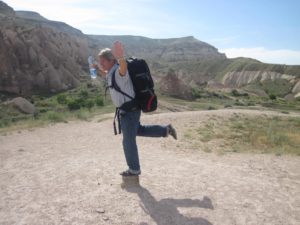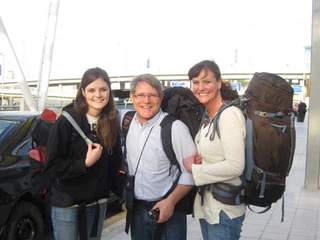Less is more when it comes to what to pack.
Okay, if you are going to be hiking the Adirondack trail or climbing Mt. Everest then you should in fact bring all items that may be needed along the way from the beginning. But unless you will be in primitive areas in utter isolation, you can get most of what you need in any country in the world.
You will be able to find medicines (other than prescription), shampoo, sunscreen and most toiletries at any pharmacy worldwide. It should be noted, however that in Muslim countries, it can be very difficult if not impossible to find tampons. Pads are readily available everywhere so if you can compromise it’s not a problem. But if tampons are non-negotiable for you and you do plan to visit Muslim countries, this is one toiletry you will need to bring along.
You may also need to make some environmental priority decisions, for instance, bottled water will be available worldwide (warning: if you choose to use bottled water always check that you are getting a sealed bottle before you pay), but, if the 1.5 million tons of plastic waste they create each year is of concern to you, then I recommend bringing a filter system. These can be a bit cumbersome and add weight to your pack, but are worth it to help cut down on plastic polution.
If you do require prescription drugs, my first advice would be to ask your doctor if there are any dietary or outward changes that you could make before you leave in order to forgo the prescription meds for your time on the road. Do this far in advance so the health changes can be monitored and you can get the okay from your doctor. If your prescription is vital, talk to your doctor about your travel plans and try to get enough refills before you leave to cover the time you will be gone, or arrange for a friend or family member to refill your prescription when needed and have them sent to addresses along the way. Most hostels and certainly any private homes you may stay in should be able to arrange for delivery. Carrying a year’s supply of medicine, however, is not a good idea for several reasons; it may be an issue at border crossings, it is heavy in your pack, the chance to damage or destroy your supply is high with the way buses and taxi drivers fling packs around, it will most likely expire before you finish your supply and it may set you up as a target for theft if they are narcotic meds.
 Clothing is a tough one, especially if this is your first long term travel experience. Clothing, like other necessities, are sold around the world and usually cheaper than what you would pay in the US. After a while you will settle in to your favorite outfits anyway, and care less and less that you wear them for three consecutive days. I had a travel-day outfit which I wore on trains and long bus rides. My travel-day outfit was a pair of baggy pants we deemed “habibs”. They were cotton with loose elastic around the ankle; this became important in countries where the toilet on the train was a hole in the floor. Pulling my pant legs up and knowing they would stay up while I grappled to retain my balance on a jerky train was exceedingly important. I would pare the habib pants with a tank top covered with a T-shirt and a scarf around my neck. The scarf had several uses; lap blanket or shoulder wrap when it got a little chilly, and head cover when in Muslim or Hindu countries.
Clothing is a tough one, especially if this is your first long term travel experience. Clothing, like other necessities, are sold around the world and usually cheaper than what you would pay in the US. After a while you will settle in to your favorite outfits anyway, and care less and less that you wear them for three consecutive days. I had a travel-day outfit which I wore on trains and long bus rides. My travel-day outfit was a pair of baggy pants we deemed “habibs”. They were cotton with loose elastic around the ankle; this became important in countries where the toilet on the train was a hole in the floor. Pulling my pant legs up and knowing they would stay up while I grappled to retain my balance on a jerky train was exceedingly important. I would pare the habib pants with a tank top covered with a T-shirt and a scarf around my neck. The scarf had several uses; lap blanket or shoulder wrap when it got a little chilly, and head cover when in Muslim or Hindu countries.
I did however take a pair of jeans. I will be honest, they are heavy, they are difficult to wash and take a horrendous amount of time to line dry. But I took my jeans and never regretted it, so make a personal choice on one or two favorites and be very minimal with the rest of your wardrobe.

